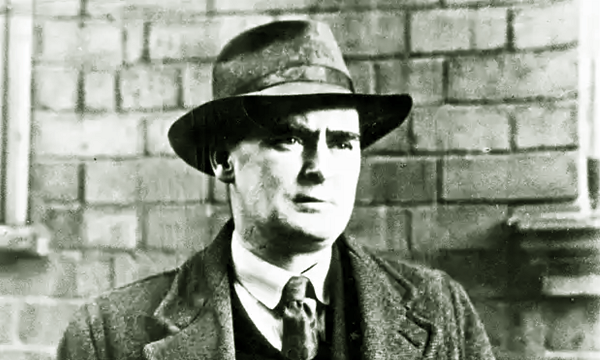THE MUSE

BRIAN O’NOLAN
“Remember that I too was Irish. Today I am cured. I am no longer Irish. I am merely a person. I cured myself after many years of suffering.”
Today, Brian O’Nolan is regarded as a key figure in postmodern literature, but this legacy is somewhat new. Although he wrote widely as contributor to magazines and newspapers, his books sold poorly in his lifetime, causing him to doubt his ability and ambitions as a novelist. Until very recently, his reputation was set firmly inside the twin shadows of James Joyce and Samuel Beckett.
O’Nolan was born in 1911 in Strabane, a small town on the edge of the Sperrin Mountains that today borders the Irish Republic and Northern Ireland. Back then the country was united, but under a strict British rule that was widely opposed, not least by O’Nolan’s parents.
Third of 12 children, he only spoke and wrote Gaelic until he was seven. All were kept away from the English language and out of the British-controlled, English-speaking schools – creating an “incestuous little Gaeltacht” (an Irish-speaking region) at home.
When the family moved to Dublin, the city like the country, was poor, unstable, and divided following the end of British rule in 1922. As Ireland searched for stability and feared sedition, the new government-imposed restrictions on artists and writers. In 1929, the Censorship of Publications Act limited public access or consumption of subversive works of art.
It was into this that O’Nolan—while also working as a civil servant—began to flourish as a writer and newspaper columnist, rising to the challenge of avoiding government restrictions by injecting literary tools and devices into his writing.
He developed a complex, ambiguous style with allegory and metaphor that enabled him to address current affairs and politics while avoiding censorship.
Throughout his career he wrote under the various pseudonyms of Myles na Gopaleen, Brother Barnabas, Flann O’Brien, and George Knowall.
“Moderation, we find, is an extremely difficult thing to get in this country”—and while it was reasonably common knowledge that O’Nolan was behind each of them, it presented him with a useful conceit through which to deliver his highly stylized prose.
Plus, it created an additional distraction, deflecting official eyes away from his camouflaged political opinion.
Although only his first two novels carry the name Flann O’Brien, it’s under this identity that all of his work has subsequently come to prominence.
He published his first novel— At Swim-Two-Birds—in 1939. It sold poorly and as a result, the planned follow-up—The Third Policeman—was rejected by every publisher including his own, concluding, “We realize the author’s ability but think that he should become less fantastic and in this new novel he is more so.”
Humiliated, he—falsely—told his friends he’d lost the manuscript, describing the pages flying one by one out the boot of a car speeding along the back roads of Connemara. In reality, the manuscript sat at home, untouched and largely ignored, until it was published posthumously in 1967.
His body of written work—six novels and numerous collections of plays, essays and articles—is extensive, but it’s in The Third Policeman that O’Nolan’s command of language and narrative is seen at its sharpest.
In the late 1930s, his strange style was so innovative and unusual, it struggled to find an audience in the culture of its creation. A fragile Ireland and a war-ravaged Europe weren’t yet ready for Flann O’Brien. It’s different now, almost a century later; his work connects easily with our 21st-century sensibilities.
The Third Policeman is seen broadly as an extraordinary work. He uses English in exuberant, inventive, and unexpected ways that you might expect of a non-native speaker. But those familiar with how Gaelic is written and spoken can hear its latent spark within its pages—taking the reader on the “fantastic” journey his publisher didn’t want—elevated by his skillful and irrepressible command of both languages.
Author Edna O’Brien wrote, “Along with Joyce and Beckett, Flann O’Brien constitutes our trinity of great Irish writers.” And while he may not yet be elevated to the heights of those twin pillars of Irish literature, he is out of their shadows and increasingly acknowledged in their context. Praise indeed for a man with five names.
“It only occurred to me the other day that I will have biographers… All sorts of English persons writing books ‘interpreting’ me.”
HAPPENING

Saturday, June 18
20th Annual 5K Run/Walk for the Arts
9am for Walk, 9:30am for Run
Join us for our 20th annual Run/Walk for the Arts! The whole family can be a part of this event in the scenic Bass River village of S. Yarmouth.
Enjoy the unbeatable scenery and a flat, manageable course that begins and ends at the Cultural Center.
Participants will receive a commemorative Run/Walk for the Arts T-shirt if registered before June 1. Prizes will be awarded for 1st, 2nd, and 3rd place per age division and gender. Teams are encouraged and a special award will also be given for the largest team. We hope you’ll join us! This year’s event benefits our youth programs.
Register before June 17.
$25

